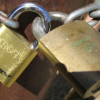Code team cracked Soviet's ciphers
Source: Telegraph (UK)
The codebreakers of Bletchley Park not only broke into the secrets of the German Enigma machine, but also succeeded in cracking the main Russian machine ciphers.
The success of British cryptanalysts during the Second World War in cracking the German machine is well known, but their work on Soviet machines has remained secret.
Now, for the first time, details of GCHQ's early Cold War successes against the Soviet Union are revealed in The Spying Game, by Michael Smith. He describes how one of the most precious secrets of the early Cold War was betrayed to the Soviet Union by an American spy.
Smith says the British codebreakers agreed to work with the Americans on Soviet codes and ciphers. By September 1946, the academics turned codebreakers were sending the Americans material produced from a Russian enciphered teleprinter system they had codenamed Caviar.
But their best successes came after a move from Bletchley Park to Eastcote, Middlesex, when they broke main Soviet military machine ciphers known as the Poets series.
This followed GCHQ's breaking of the first Poet system in early 1946. Called Coleridge, it was used by the Soviet army, navy and air force on main communications networks in the USSR.









































































